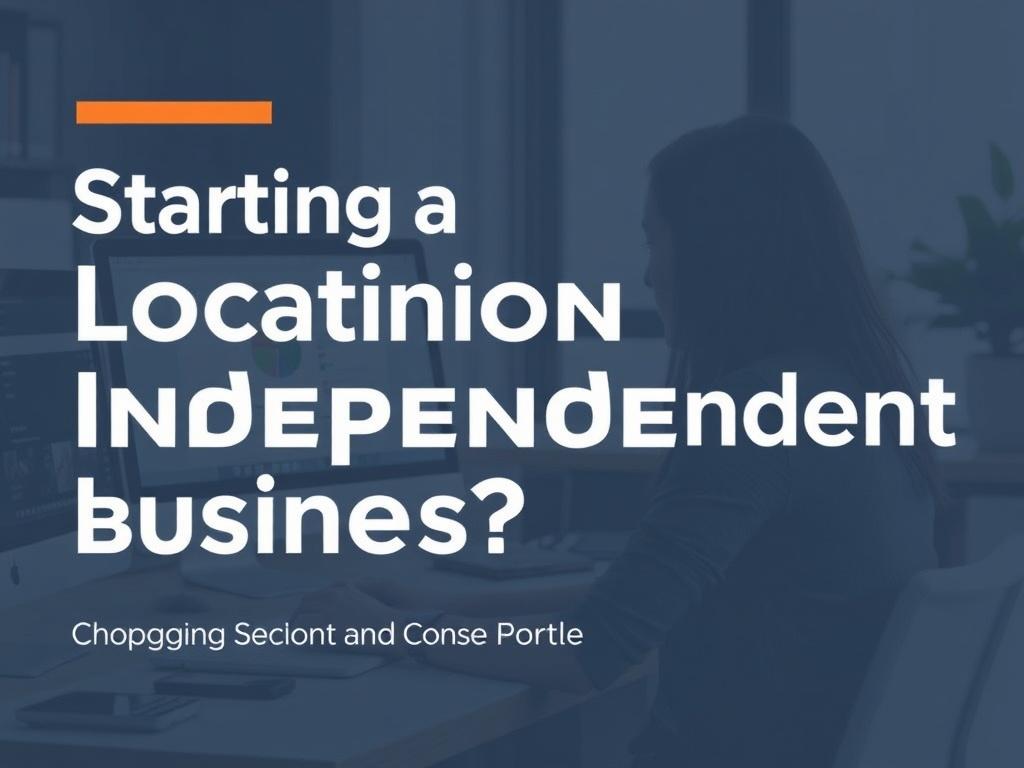Imagine waking up to a beautiful beach sunrise or sipping coffee in a cozy mountain café, all while managing your own business. This isn’t just a dream for digital nomads or freelancers anymore—it’s a real possibility for anyone willing to embrace the idea of a location-independent business. Whether you crave the freedom to travel or want to break free from the 9-to-5 grind, starting a location-independent business offers a pathway to financial independence and flexibility. In this comprehensive article, we’ll walk you through everything you need to know about launching and growing a business that lets you work from anywhere.
What Is a Location-Independent Business?
A location-independent business is one that doesn’t rely on a physical office or storefront. Instead, it can be operated from virtually anywhere with an internet connection—be it your home, a coffee shop, or halfway across the world. Thanks to advances in technology, more entrepreneurs are choosing to create businesses that allow them to work remotely, giving them a lifestyle driven by freedom and choice.
This business model works especially well in today’s digital era, where communication tools, cloud computing, and online marketing make it possible to stay connected with clients, manage operations, and sell products worldwide.
Why Start a Location-Independent Business?

Location-independent businesses are appealing for many reasons. Perhaps the most attractive benefit is flexibility—both in work schedule and workspace. If you value traveling or simply don’t want to be tied down to a single location, this business type can help you live life on your own terms.
Beyond lifestyle benefits, location-independent businesses often have lower startup costs and fewer barriers than traditional brick-and-mortar enterprises. You avoid expenses like rent, utilities, and commuting costs, allowing you to invest more in your products, services, and marketing.
Here are a few key reasons entrepreneurs choose to start location-independent businesses:
- Work anywhere in the world with just a laptop and internet connection
- Set your own schedule to prioritize work-life balance
- Access a global market without geographic constraints
- Reduce overhead costs and increase profit margins
- Build a scalable business that grows digitally
Popular Types of Location-Independent Businesses
The possibilities for location-independent businesses are vast and varied. Many entrepreneurs leverage their skills, digital tools, and online platforms to create thriving businesses. Here’s a detailed table showcasing some popular types along with their pros and cons:
| Business Type | Description | Pros | Cons |
|---|---|---|---|
| Freelance Writing and Content Creation | Writing articles, blog posts, or marketing content for clients worldwide | Low startup cost, flexible schedule, high demand | Income can be inconsistent, competitive market |
| Online Coaching or Consulting | Offering personal or professional guidance via calls or courses | Leverages expertise, scalable through online courses | Requires building trust and credibility, time-intensive |
| E-commerce Store | Selling products online through platforms like Shopify or Etsy | Global reach, high earning potential | Inventory management, shipping logistics |
| Affiliate Marketing | Promoting other companies’ products for commission | Passive income potential, low investment | Requires strong audience and marketing skills |
| Software as a Service (SaaS) | Developing and selling software tools or apps online | Recurring revenue, scalability | Requires technical skills and ongoing maintenance |
Essential Steps to Start Your Location-Independent Business

Launching a location-independent business might sound exciting, but it requires thoughtful planning and consistent effort. Here’s a step-by-step roadmap to help you get started on the right foot.
Step 1: Identify Your Skills and Passion
Begin by assessing your strengths, interests, and marketable skills. A successful location-independent business often intersects what you love doing with what potential clients need. This alignment ensures you stay motivated and deliver value.
Step 2: Choose a Profitable Business Model
Review the different business types—like freelancing, e-commerce, or online coaching—and pick the one that fits your skills and goals. Research your niche to ensure there’s demand and room for your unique approach.
Step 3: Create a Business Plan
Even for location-independent businesses, drafting a business plan is vital. Outline your target audience, marketing strategies, revenue streams, and financial projections. This blueprint will guide your decisions and keep you focused.
Step 4: Build Your Online Presence
Since you won’t have a physical location, your online presence becomes your storefront. Develop a professional website, optimize your social media profiles, and consider starting a blog or YouTube channel to connect with audiences and build trust.
Step 5: Set Up Efficient Systems and Tools
Using the right technology makes managing your business smoother. Project management software, communication apps, accounting tools, and cloud storage are essential to maintaining productivity remotely.
Step 6: Promote Your Business
Invest time in marketing through SEO, content marketing, email campaigns, and social media advertising. Networking with other entrepreneurs and building partnerships can also help you expand your reach.
Key Tools for Running a Location-Independent Business
Utilizing the right digital tools is crucial when starting a location-independent business. These tools help you stay connected, manage tasks, and deliver quality service no matter where you are.
- Communication: Zoom, Slack, Microsoft Teams
- Project Management: Trello, Asana, Monday.com
- File Storage and Sharing: Google Drive, Dropbox
- Accounting and Invoicing: QuickBooks, FreshBooks, Wave
- Website Building: WordPress, Squarespace, Wix
- Marketing: Mailchimp, Buffer, Hootsuite
Challenges You May Face and How to Overcome Them
Like any business, running a location-independent venture comes with its own hurdles. Being aware of these challenges helps you face them proactively.
Loneliness and Isolation
Working remotely means you may miss out on daily interactions with colleagues. To counter this, join digital nomad communities, coworking spaces, or attend networking events to stay socially connected.
Time Management
Your freedom can be a double-edged sword if you struggle to maintain discipline. Establish daily routines, set clear goals, and use productivity techniques like the Pomodoro method to stay on task.
Variable Income
Many location-independent businesses, especially service-based ones, may experience fluctuating earnings. Build a financial buffer, diversify income sources, and consider retainer agreements to soften income variability.
Legal and Tax Considerations
When you work remotely or travel often, figuring out taxation and legal responsibilities can be complex. Consult with a professional accountant or lawyer familiar with international business to ensure compliance.
Top Tips for Success in a Location-Independent Business
Here’s a helpful list of practical tips that can increase the chances of your success and fulfillment:
- Focus on building strong client relationships. Trust and communication are key when you can’t meet face-to-face.
- Keep learning and updating your skills. Digital trends and tools evolve fast, so stay current.
- Prioritize your health. Work-life balance and physical well-being are vital for sustaining your lifestyle.
- Embrace failure as a learning opportunity. Not every idea will work, but resilience will keep you moving forward.
- Network within the remote work community. Collaboration can lead to new clients and partnerships.
- Automate repetitive tasks. This frees up time for strategic growth and creativity.
Examples of Successful Location-Independent Entrepreneurs
Many people have proven that a location-independent business can be both profitable and enjoyable. Here are a few inspiring examples you might look up to:
- Pat Flynn — Founder of Smart Passive Income, who builds multiple digital income streams while traveling the world.
- Marie Forleo — Life coach and entrepreneur who leverages online courses to empower clients globally.
- Tim Ferriss — Author and podcaster who popularized lifestyle design and remote entrepreneurship.
Financial Considerations When Starting Out
Although many location-independent businesses cost less to start than traditional businesses, budgeting is essential. Below is an estimated cost breakdown for some basic expenses you might face early on:
| Expense | Estimated Cost | Notes |
|---|---|---|
| Website Domain and Hosting | $50 — $200/year | Depending on provider and plan |
| Business Software Subscription | $20 — $100/month | Project management, CRM, accounting tools |
| Marketing and Advertising | $100 — $500/month | Social media ads, SEO, content creation |
| Equipment | $500 — $2000 | Laptop, headphones, camera (if needed) |
| Education and Training | $0 — $1000 | Courses, coaching, workshops |
Legal Structure and Registration Tips
When you’re considering the legal side of your location-independent business, choosing the right business structure is important. Common forms include sole proprietorships, limited liability companies (LLCs), and corporations. Each has different implications for taxes, liability, and paperwork.
For many startups, forming an LLC strikes a good balance by protecting personal assets while keeping compliance manageable. Be sure to register your business properly within your country or state and obtain any necessary permits or licenses.
How to Maintain Work-Life Balance
One of the greatest challenges of a location-independent business is separating work from relaxation—especially when your workspace follows you everywhere. Creating clear boundaries is crucial. Here are some strategies:
- Designate a specific workspace, even if it’s just a corner of a room
- Set regular working hours and stick to them
- Schedule breaks and leisure activities just like meetings
- Limit distractions by turning off notifications during work blocks
- Stay physically active with regular exercise
Future Trends of Location-Independent Business
As remote work becomes the new normal and technology continues to advance, location-independent businesses will only grow in popularity. We can expect to see more AI-driven tools to automate tasks, greater integration of virtual reality for client meetings, and expanded opportunities in emerging markets. Keeping ahead of these trends will help you stay competitive and inspired.
Conclusion

Starting a location-independent business isn’t just about chasing an adventurous lifestyle—it’s about creating a sustainable, flexible way to earn income on your own terms. By carefully selecting a business model that fits your skills and passions, setting up the right systems, and embracing the challenges, you can build a thriving enterprise that supports your freedom and goals. Whether you’re dreaming of working from a beach, your cozy home office, or a bustling city café, the tools and opportunities available today make location-independent entrepreneurship more accessible than ever before. Remember, success requires dedication, adaptability, and continuous learning—but above all, the reward is a lifestyle where you control your own destiny.









